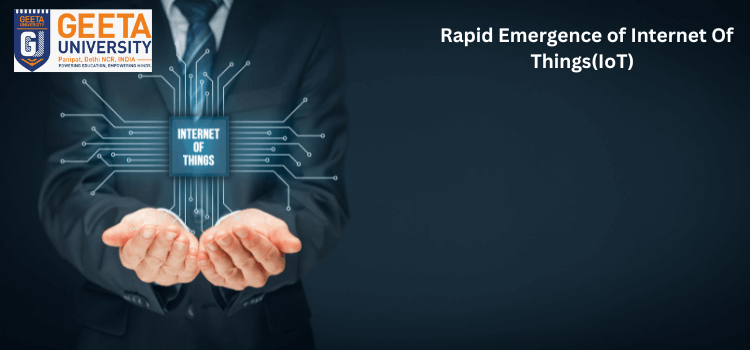
Rapid Emergence of Internet Of Things(IoT) – Geeta University
The Internet of Things (IoT) is a rapidly growing network of devices, sensors, and objects connected to the internet, allowing them to exchange data and perform tasks automatically. With the advancements in technology and the increase in connectivity, the IoT has become an essential part of our daily lives.
Imagine waking up in the morning, and your coffee machine automatically starts brewing your coffee, while your thermostat adjusts the temperature to your preferred level. As you step out of your house, your car starts and navigates to your office, while your smartwatch tracks your health data and sends it to your doctor. All of this is possible because of the IoT.
This has transformed various industries, including healthcare, transportation, agriculture, and manufacturing. In healthcare, wearable devices and sensors can track patients’ health data, allowing doctors to monitor and diagnose their conditions remotely.
- In transportation, smart traffic lights and sensors can optimize traffic flow and reduce congestion.
- In agriculture, sensors can monitor soil moisture levels and adjust irrigation systems, improving crop yields.
- In manufacturing, IoT devices can track inventory levels, automate processes, and reduce waste.
The IoT has also revolutionized the way we interact with our homes. Smart homes have become increasingly popular, with devices like Amazon Echo and Google Home allowing users to control various appliances and devices using their voice. Smart thermostats, lighting, and security systems can be controlled remotely using a smartphone, making our lives more convenient and comfortable.
However, as with any technology, it also comes with its own set of challenges. One of the significant concerns is data privacy and security. With so much data being transmitted over the internet, there is a risk of data breaches and cyber-attacks. It is crucial to ensure that these devices are secure and protected from hacking attempts.
Another challenge is the lack of standardization across the industry. With so many different devices and technologies being used, interoperability between them can be a challenge. This can result in compatibility issues and make it difficult for users to integrate different devices into their IoT ecosystem.
Despite these challenges, it continues to grow and evolve. As more devices become connected to the internet, the potential for innovation and growth is immense. The IoT has the potential to transform our world, making it more efficient, sustainable, and connected.
In conclusion, the Internet of Things is an exciting and rapidly growing technology that has the potential to transform the way we live, work, and interact with the world. While there are challenges that need to be addressed, the benefits of the IoT are vast and far-reaching. As we continue to innovate and explore the possibilities of it, we can create a more connected and sustainable world for future generations.
Nowadays, there are various programs are provided at the best universities in India & abroad to uplift the skills required in this evolving digital world.
Related Posts
كيفية إنشاء حساب 1xbet تسجيل الدخول للمراهنين في المغر
كيفية إنشاء حساب 1xbet تسجيل الدخول للمراهنين في المغرب تسجيل الدخول باستخدام Apple Identity Apple دعم Sa Content اكتشف طريقة 1xbet التسجيل عبر الإنترنت ثانيًا:
Mostbet Nadir Casino Mosbet Kazin Ugostiteljska Oprema Za Hotele I Restorane
Mostbet Nadir Casino Mosbet Kazin Ugostiteljska Oprema Za Hotele I Restorane2013-cü ildə yaradılıb və o vaxtdan ölkənin aparıcı bukmeker kontorlarından birinə çevrilib. Təbiidir ki, biz

Data Privacy
Introduction In an era dominated by digital interactions and interconnected technologies, the concept of data privacy has emerged as a critical concern. As individuals, businesses,


